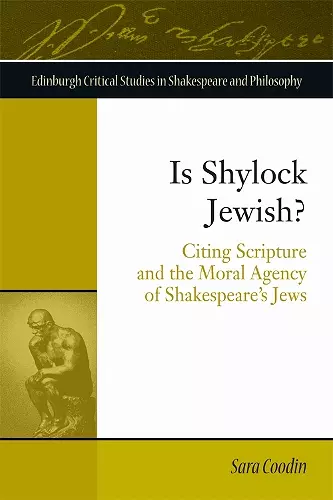Is Shylock Jewish?
Citing Scripture and the Moral Agency of Shakespeare's Jews
Format:Hardback
Publisher:Edinburgh University Press
Published:12th Jun '17
Currently unavailable, and unfortunately no date known when it will be back

Analyses alternative contexts for the moral agency of Jewish characters in The Merchant of Venice. Provides an innovative study of Renaissance Christian Hebl6th and early 17th centuries. Discusses important 19th- and 20th-century Yiddish-language adaptations of The Merchant of Venice. Makes a provocative and original argument about the importance of Judaic biblical exegesis to the long afterlife of Shakespeare's The Merchant of Venice.
Is Shylock Jewish studies Shakespeare’s extensive use of stories from the Hebrew Bible in The Merchant of Venice, and argues that Shylock and his daughter Jessica draw on recognizably Jewish ways of engaging with those narratives throughout the play.A detailed exploration of the significance of Hebrew Biblical stories in The Merchant of Venice What happens when we consider Shakespeare’s The Merchant of Venice as a play with ‘real’ Jewish characters who are not mere ciphers for anti-Semitic Elizabethan stereotypes? Is Shylock Jewish studies Shakespeare’s extensive use of stories from the Hebrew Bible in The Merchant of Venice, and argues that Shylock and his daughter Jessica draw on recognizably Jewish ways of engaging with those narratives throughout the play. By examining the legacy of Jewish exegesis and cultural lore surrounding these biblical episodes, this book traces the complexity and richness of Merchant’s Jewish aspect, spanning encounters with Jews and the Hebrew Bible in the early modern world as well as modern adaptations of Shakespeare’s play on the Yiddish stage. Key Features Analyses alternative contexts for the moral agency of Jewish characters in The Merchant of VeniceProvides an innovative study of Renaissance Christian Hebraism in England and English perceptions of Jews and Jewishness in the sixteenth and early seventeenth centuriesDiscusses important nineteenth- and twentieth-century Yiddish-language adaptations of The Merchant of VeniceMakes a provocative and original argument about the importance of Judaic biblical exegesis to the long afterlife of Shakespeare’s The Merchant of Venice
Sara Coodin demonstrates how The Merchant of Venice’s engagement with the Genesis narratives of Jacob resonates with centuries of rabbinic midrash, early modern Christian Hebraist exegesis and 20th-century Yiddish adaptations of the play to argue that Shakespeare’s play supports Jewish interpretations that would have been legible to his Christian audience. -- M. Lindsay Kaplan, Georgetown University
ISBN: 9781474418386
Dimensions: unknown
Weight: 555g
272 pages